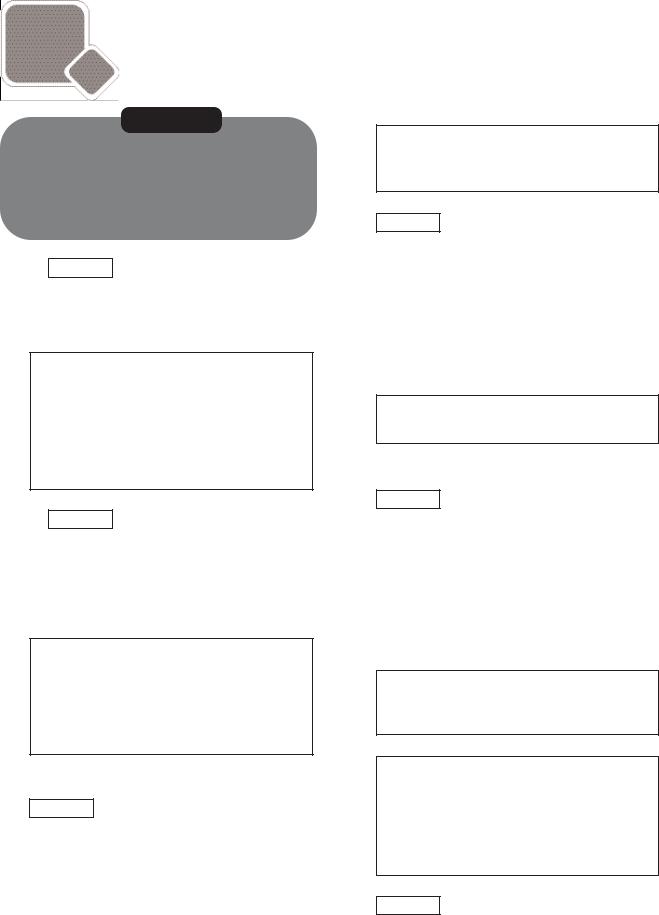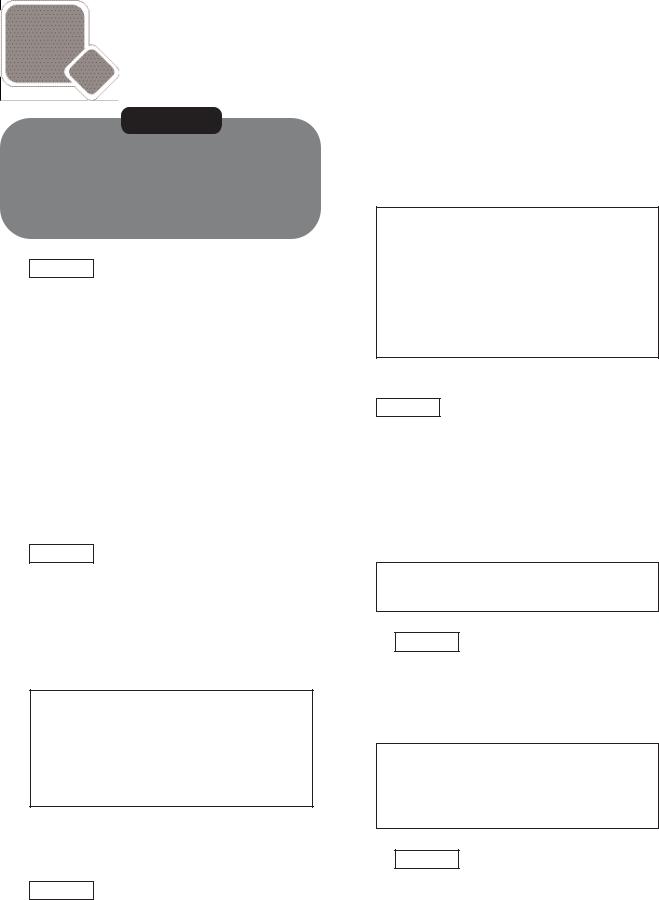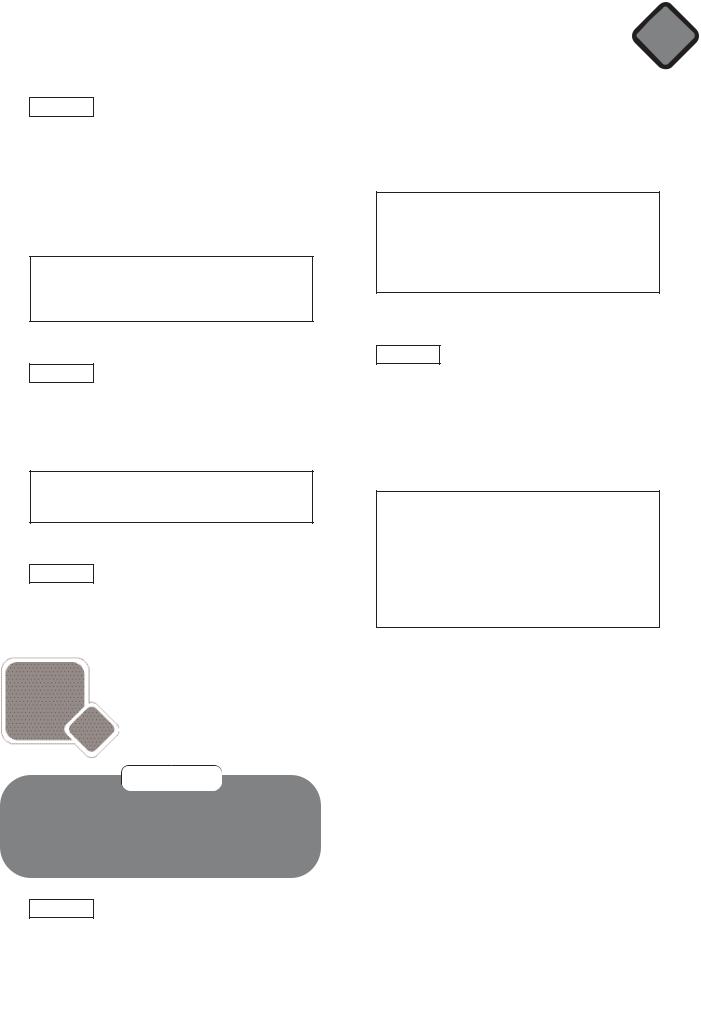
Учебники школьные / анг яз уч ответы
.PDF
Across the Curriculum ― Literature |
5 |
|
|
4Focus Understanding new vocabulary
ñRefer Ss to the words in bold and have them match them with their meanings.
ñElicit answers and check.
Answer Key
heiress ― person who has inherited a lot of money
gets married ― (a couple) promise to be with each other
authorises ― makes it legal righteous ― morally good and fair sentence ― judgement confiscated ― seized, taken away rest assured ― be certain
5Focus Role playing an extract
ñHave Ss listen to the extract.
ñInvite different Ss to act out the script.
(Ss’ own answers)
6Focus Discussing a character in a play
ñIn groups of 3-4, have Ss discuss the task.
ñDirect Ss to justify their answers with dialogue from the extract.
ñMonitor the activity and assist as necessary.
Suggested Answer Key
A:I think Shylock is feeling very powerful in the beginning.
B:Yes, I agree. He believes he is right and the lawyer is on his side.
C:But then, he must feel very afraid when
the lawyer says he will die and lose everything when she says, if you spill one drop of blood you will die.
A:I think he feels shocked and confused because he doesn’t know the law when he asks, is that the law?
B:He seems very desperate when he tries to convince the lawyer to give him the money and forget the pound of flesh.
7Focus Listening for comprehension
ñSs listen to the outcome of the story.
ñIn groups of 3-4 have Ss think up a different ending to the story.
ñInvite groups to present their ending to the class and discuss.
Suggested Answer Key A new ending
Shylock tried to take his pound of flesh from Antonio. He cuts his heart out, but of course, Antonio begins to bleed and the court orders him to stop. Shylock is put in jail immediately for trying to murder Antonio and all of his possessions are taken by the court. Antonio is OK and is taken to the doctor and Shylock’s daughter is given all of her father’s things, by the court.
8Focus Writing a summary of a play
ñDirect Ss to make notes from the text.
ñAllow Ss time to write their summaries.
ñInvite Ss to read their summaries in class.
Suggested Answer Key
Antonio is a wealthy merchant in Venice. He owns many ships. His friend Bassanio wants to marry the heiress, Portia. Bassanio asks his friend Antonio to lend him money to marry Portia. However, Antonio doesn’t have money at the moment because his ships are all at sea. Together, they go to Shylock, the evil moneylender, and make a deal with him. Antonio promises Shylock a pound of flesh if he can’t pay back the loan.
After some time, the money was due and Antonio couldn’t pay it. Shylock took him to court and demanded his pound of flesh. Meanwhile, without anyone knowing, Portia dressed up like a lawyer and came to court to try to help Antonio. She convinced everyone that Shylock could have his pound of flesh, but without taking any blood. This was of course impossible and in the end Shylock had to leave the court with nothing. He was forced to promise to give his possessions to his daughter when he dies.
9Focus Interpreting meaning
ñHave Ss discuss the quote and what it means.
ñMonitor the activity and assist as necessary.
Suggested Answer Key
The quote means that it is up to each person to decide what will or won’t happen in their lives. We are all responsible for our own actions and what happens to us.

5 |
Across the Curriculum ― Literature |
|
|
10 Focus Presenting a famous playwright
In groups of 3-4 have Ss complete their research. Invite groups to present their information to the class and ask the class for feedback.
Suggested Answer Key
William Shakespeare was born in April, 1564 in Stratford-upon-Avon, Warwickshire, about 100 miles northwest of London. He went to school there for some time and it is believed that he was taken out by his father and learned his trade as a leather maker; making purses, belts and gloves.
He married Anne Hathaway on 28 November 1582. They had three children, two girls and a boy, who died at a young age.
Shakespeare was famous for writing 36 plays. Many of these plays were staged at The Globe Theatre in London. The plays could only be acted out by men, even the female roles. He started writing historical pieces and comedies and sometime after 1599, perhaps after the death of his son, he started writing tragedies. Shakespeare died 23 April, 1616.
5 |
Progress Check |
|
|
Progress Check 5 and Look at Module 6 should be done in one lesson.
Answer Key |
|
|
|
|
|
|
|
|
|
|
|
|
|
||
1 |
1 |
special |
6 |
miniature |
3 |
1 |
redo |
|
|
|
|
4 |
disappear |
|
|
|
2 |
all-star |
7 |
success |
|
2 |
misunderstand |
|
|
5 |
recreate |
|
|||
|
3 |
potter’s |
8 |
artistic |
|
3 |
undergo |
|
|
|
|
|
|
|
|
|
4 |
anonymous |
9 |
action |
|
|
|
|
|
|
|
|
|
|
|
|
5 |
spray |
10 |
private |
4 |
1 |
in |
2 |
of |
3 |
of |
4 |
at |
5 |
with |
2 |
1 |
later |
6 |
tallest |
5 |
1 |
over |
|
|
3 |
away |
|
5 |
into |
|
|
2 |
the worst |
7 |
better, better |
|
2 |
through |
|
4 |
out |
|
|
|
|
|
|
3 |
more carefully |
8 |
more patient |
|
|
|
|
|
|
|
|
|
|
|
|
4 |
the most intelligent |
9 |
more skilfully |
6 |
1 |
e |
2 |
d |
3 |
b |
4 |
a |
5 |
c |
|
5 |
the most talented |
10 |
more hardworking |
|
|
|
|
|
|
|
|
|
|
|
104

Town & Community |
Module |
6 |
|
|
|
Before you start …
ñWork through the questions with the class, asking follow up questions to encourage Ss to expand on their answers as much as possible. (e.g. Describe your favourite artist’s work. Why do you like this artist? Which artist don’t you like? Why? Describe to your partner how your favourite painting makes you feel?)
ñMake sure Ss understand this section and use the prompts to recycle vocabulary seen in Module 5.
Pic 3 (p. 90)
What is happening in this picture? Do you think it is important to help our communities? What kinds of things can we do to help?
Pic 4 (p. 96)
What does this picture show? What other places do you see in the pictures? Do you go to any of these places? What are some services near you house?
Look at Module 6
ñRefer Ss to the title of the module, Town & Community, and invite them to suggest what they think it means and what they expect to learn from the module.
Suggested Answer Key
The title means the places where we live and the people we live with such as our neighbours. I think we will learn about different places to live and people in different communities.
ñAsk Ss to look through the module and find the page numbers for each of the pictures. Ask questions to stimulate a discussion about them.
Suggested Answer Key
Focus Ss’ attention on pic 1 (p. 89).
T: What page is the picture on? S1: It’s on page 98.
T: What is this a picture of? S2: It a picture of a museum?
T: What places do you like to visit? Why?
S3: I like visiting zoos because I like watching and learning about the animals
T:Do you think it is important to go to museums and art galleries? Why or why not?
S4: I think it is very important as we learn about history and other cultures at museums and art galleries show us different ways that people communicate and express themselves.
Pic 2 (p. 102)
What is this a picture of? What forms of transport do you use? Which form of transport from the pictures in the unit would you like to try? Why?
Find the page number(s) for
Allow Ss time to browse through the module and find the items. Ask them to explain what each item is and elicit simple information about each of them.
Suggested Answer Key a street map (p. 92)
Why do we use maps? What does this map show? Do you ever use a map? Do you find them easy to follow? Have you ever been lost and asked for directions? Did the directions help you find where you were going?
a quiz (p. 95)
What is this quiz about? Do you like quizzes? Do you know much about other places in the world? Do you think monuments are important and should be preserved? Why or why not?
a quotation (p. 103)
What does this quotation say? What does it refer to? Why do we remember quotations?
Explain that the module has:
―a Culture Corner
―a Going Green section
Ask Ss to look at the relevant pages and elicit what each section is about (Welcome to Sydney, Australia, Green Transport).
Listen, read and talk about …/Learn how to …/ Practise …/Write/Make …
Select Ss to read through the list of items that will be covered in the module. If necessary, explain any new vocabulary. Ask Ss to go through the list and tick any items they think they know or can do, put a cross next to the ones they do not know and a star next to the ones they think will be the most useful. Select Ss to report on which items they have ticked or put a star next to.
105

6 a Reading & Vocabulary
Objectives
Vocabulary: animals; related to volunteer work Reading: reading for confirmation; reading for comprehension/gist
Speaking: role playing; trying to persuade
Writing: an email
Answer Key
The text is about helping out at an animal shelter.
3Focus Reading for comprehension/gist
(matching headings to paragraphs)
1 a) Focus Introducing the topic of a text/
describing pictures
Refer Ss to the pictures and elicit answers to the questions in the rubric.
Answer Key
Picture A shows a woman helping a disabled senior citizen.
Picture B shows a man visiting senior citizens. Picture C shows people giving supplies to victims of an earthquake.
Picture D shows people planting trees.
b)Focus Discussing the topic of a text
ñInvite Ss to tell the class if they have done any of the activities listed in Ex. 1a and which of these activities they would like to do and why.
ñCheck for correct use of vocabulary.
Suggested Answer Key
I have worked with senior citizens before. I would like to work with an aid agency, helping people after natural disasters. I think it would be very rewarding and you would feel like you are making a difference for people.
Reading
2Focus Predicting the content of a text/
Listening and reading for confirmation
ñRefer Ss to the title of the text and read the first and last sentences of each paragraph.
ñElicit what the text is about and write answers on the board.
ñPlay the recording while Ss read along to check their answers.
ñRead the study skills box aloud and check Ss understand it.
ñDirect Ss to read the headings and then search the text for key words related to the headings.
ñSs complete task and compare answers with a partner.
ñCheck answers in class.
Answer Key
1 C |
2 E |
3 D |
4 A |
5 F |
Vocabulary
4Focus Expanding vocabulary
ñElicit the animals named in the text. Write them on the board.
ñHave Ss write the headings from the rubric and any other headings they can think of.
ñSs complete their lists under the headings.
ñSs compare their answers with a partner.
ñWrite the headings on the board and elicit answers.
Answer Key
cats, dogs, horses, sheep, goats, chickens, ducks, llama, pony, guinea pig
Suggested Answer Key
farm: horse, pony, sheep, chicken, rooster, cat, guinea pig
wild: lion, tiger, elephant, moose, bear bird: duck, parrot, pigeon
fish: perch, trout, salmon
5Focus Practising vocabulary
ñHave Ss read through the rubric and check they understand the words.
ñSs complete the task and check their answers with a partner.
106

ñHave Ss write sentences about the boy in the text.
ñAsk various Ss to read out their sentences and check for correct use of vocabulary.
Answer Key |
|
|
|
|
|
1 |
animal |
5 |
take |
9 |
charity |
2 |
natural |
6 |
burst |
10 |
senior |
3 |
staff |
7 |
full |
|
|
4 |
answer |
8 |
foster |
|
|
|
|
|
|
|
|
Suggested Answer Key
2 Richard’s love for animals made it a natural choice to volunteer at the animal shelter.
3 Richard assists staff members with their duties at the shelter.
4Sometimes Richard answers phone calls at the shelter.
5Many animal owners don’t take care of their animals properly.
6Richard wanted to burst into tears when he saw the neglected pony.
7The pony made a full recovery and is fine now.
8Some animals stay at a foster home and get special care.
9Richard suggests going to a charity event as a way to help out in your community.
10One great way to volunteer is to visit a senior citizen for a few hours a week.
6Focus Practising vocabulary
ñHave Ss complete the task.
ñInvite Ss to read out their answers and check.
Answer Key |
|
|
|
1 |
donates |
4 |
encouraged |
2 |
volunteer |
5 |
getting involved |
3 |
support |
|
|
|
|
|
|
Speaking
7Focus Using vocabulary to persuade
ñIn pairs, Ss take roles and try to persuade each other to volunteer.
ñDirect Ss to use the vocabulary from the text.
ñMonitor the activity and assist as necessary.
ñTell Ss to switch roles and repeat the activity.
Reading & Vocabulary 6a
Suggested Answer Key
You should think about coming to the with me. You get to work with a lot
different kinds of animals and do lots of jobs have even worked with a llama; I had seen one of those before. I am learning a about animals and I hope one day I will be
to do more to help them. Sometimes it makes me sad to think about the things people done to these animals, but then I think
all of the good we are doing and I know it is worth it. Think about it and let me know. could use all of the help they can get.
Writing
8Focus Writing an email
ñRead the rubric with Ss and check understand the task.
ñDirect Ss to follow the prompts in the when writing their emails.
ñAllow Ss time to write their Alternatively, assign the task as HW.
ñInvite Ss to read their emails in class and the class for feedback.
Suggested Answer Key
Dear George,
What is new with you? I volunteering at the local Red Cross. We had earthquake last week and many of our and neighbours have lost their homes. I everyday and hand out clothes, food blankets to people that are in need. Last we had to set up beds in a huge tent people to sleep. It felt really good to something for someone else. You should about coming with me sometime. It is rewarding.
Your friend, Jack

6 b Listening & Speaking
Objectives
Vocabulary: road features; map symbols Reading: reading for coherence and cohesion Listening: listening for specific information; listening for confirmation
Speaking: role playing; asking for/giving directions
1Focus Introducing new vocabulary
ñElicit the labels for the different numbers on the map.
ñHave Ss complete the sentences.
ñInvite various Ss to read their sentences to check.
Answer Key |
|
|
|
|
|
||
1 |
G |
3 |
B |
5 |
C |
7 |
H |
2 |
F |
4 |
A |
6 |
D |
8 |
E |
1 |
roundabout |
|
|
5 |
parking |
||
2 |
pavement |
|
|
|
6 |
junction |
|
3 |
traffic lights |
|
|
7 |
bus lane |
||
4 |
zebra crossing |
|
|
8 |
hospital |
||
|
|
|
|
|
|
|
|
2Focus Understanding map symbols
ñRefer Ss to the symbols and write the headings: ‘sightseeing, transport, services’ on the board and elicit the meaning of each.
ñInstruct Ss to answer the questions.
ñElicit similar symbols used in their country.
ñCheck answers with the class.
Answer Key
sightseeing: information, public toilets, water activities, museum, nature reserves, castle transport: park & ride, cycle lane, car park services: telephone, horse riding, leisure centre, camp site
(Ss’ own answers)
Everyday English
3Focus Practising asking for and receiving
information
ñRead through the language box and check Ss understand the vocabulary.
ñIn pairs, Ss practise giving their partner directions.
ñDirect Ss to reverse roles to practise both asking for and receiving information.
ñMonitor the activity and check for correct use of vocabulary.
Suggested Answer Key
A:Excuse me, do you know how I can get to the police station?
B:Yes, the police station is on the corner of Eaton Road and Stuart Street. Just walk up Stone Street and cross the street at the zebra crossing. The station is across the street from the café.
Reading
4Focus Reading for cohesion and coherence
(missing sentences)
ñTell Ss to read the dialogue as it appears to gain an overall idea of the coherence and content. Then, read each possible answer.
ñHave Ss complete the task.
ñInvite two Ss to read out the dialogue and check answers with the class.
Answer Key
1 E |
2 B |
3 A |
4 F |
5 D |
5a) Focus Understanding phrases/expressions
ñHave Ss complete the task.
ñRead out the statements and elicit the phrases from dialogue.
ñCheck answers with the class.
Answer Key |
|
ñ Excuse me |
ñ go ahead |
ñ I’m not sure |
ñ your stay |
ñDo you mind
b)Focus Role playing a dialogue
ñHave Ss read and listen to the dialogue again.
ñIn pairs, have Ss take roles and read the dialogue and then exchange roles.
108

Listening & Speaking 6b
rises and falls as you speak.
ñ Have Ss listen to the recording and the task individually.
ñ Play the recording again. Check Ss’ answers ñ Elicit if the speaker’s intonation rises or
each question.
Answer Key
ñ Could you repeat that? ↑
ñ Is it OK to take one of these maps? ↑ ñ Is this seat taken? ↓
ñ Is there a newsagent’s near here? ↓
Speaking
9 Focus Role playing asking for/giving directions
ñ In pairs, Ss role play and ask for/give using the dialogue in Ex. 4 as a model.
ñ Ss record themselves.
ñ Tell Ss to reverse roles and repeat the
ñ Monitor the activity and assist as necessary
Suggested Answer Key
A: Excuse me. Do you know where Marco’s restaurant is? Is it nearby?
B: Yes, just go to the end of the street turn left and it’s just down on the corner.
A: Oh, thanks a lot.
6 c Grammar in Use
Objectives
Grammar: passive form; the causative; question words + ever
Listening: listening for confirmation
Writing: a quiz
1Focus Understanding the passive form
ñWrite on the board:
s |
v |
o |
Mary |
wrote |
the report. |
|
|
|
ñElicit the word order in the sentence. (Mary: subject, wrote: verb, the report: object). Now write on the board:
s |
v |
agent |
The report |
was written |
by Mary. |
|
|
|
ñElicit the word order in the sentence. Ask Ss to compare the two sentences and elicit which emphasises what happened to the subject (the passive: The report was written by Mary), rather than what the subject did (the active form: Mary wrote the report).

6c Grammar in Use
Explain the second sentence is the passive form and elicit the form:
S + to be + past participle of main verb + agent (by)
ñRefer Ss to the Grammar Reference section and review the passive.
ñHave Ss complete the task.
ñInvite Ss to read out their sentences in class and check.
Answer Key |
|
present simple |
is covered |
past simple |
was built |
past continuous |
were being removed |
present perfect |
has been reinforced |
future simple |
will be visited |
past perfect |
had been built |
modal |
can still be seen |
|
|
2Focus Understanding the agent in the
passive form
ñReview the theory box and check Ss understand when we use ‘by’ (who carries out an action) and when we use ‘with’ (what the agent used).
ñDirect Ss to pay attention to the time expressions and the verb tenses of the passive when completing the task.
ñHave Ss complete the task.
ñInvite Ss to read their answers to check.
Answer Key
2The old house was being renovated when the fire broke out.
3 The building will be finished next month.
4All of the concert tickets have already been sold.
5 ‘The Starry Night’ was painted by Van Gogh.
6 This bread was freshly baked this morning.
7A children’s playground is being built in the park now.
8 Photography is not allowed in the museum.
9The Colosseum was built by Vespasian in 70-80 AD.
3Focus Practising the passive form/
Listening for confirmation
ñHave Ss complete the quiz using the passive form.
ñ Play the recording and Ss check their answers.
Answer Key
1 When was the Eiffel Tower built?
2 What is the Taj Mahal made of?
3 Why were the Egyptian Pyramids built?
4Which famous monument can be seen from almost every part of the city?
5It is estimated that 2 to 3 million people died while building a monument.
6Which of these famous sites is endangered by tourism?
7Which famous building will be destroyed if the ravens ever leave it?
1 |
B |
3 |
A |
5 |
A |
7 B |
2 |
B |
4 |
B |
6 |
A |
|
4Focus Practising the passive
ñRead the notices in class.
ñHave Ss complete the task.
ñElicit answers and check.
Answer Key
2 Exhibits must not be touched. (gallery)
3 Renovations are being done to the museum./The museum is being renovated. (museum entrance)
4 The pool has been closed. (leisure centre)
5The lab has been moved to the 4th floor. (hospital)
5Focus Understanding the causative
ñWrite the following sentences on the board: 1 ‘Jane is doing her hair.’
2 ‘Jane is having her hair done.’
ñElicit the differences in meaning of the two sentences (In sentence 1 Jane is doing her own hair. In sentence 2 someone else is doing Jane’s hair.).
ñElicit the form of the causative and write it on the board: have + object + past participle.
ñReview with Ss the Grammar Reference section.
ñAllow Ss time to complete the task.
ñCheck answers with the class.
110

Answer Key
The first sentence (Tom is repairing his car.) is illustrated in the picture.
The second sentence (Tom is having his car repaired.) means that someone else repaired the car for Tom.
The sentence is formed by have + object + past participle.
6Focus Practising the causative
ñHave Ss complete the task.
ñElicit answers and check.
Answer Key
2 is having her nails painted by her friend.
3 is going to have his car fixed by a mechanic.
4had his bedroom painted last week by the painter.
5 will have her dress shortened by the dressmaker.
6 has had a garden shed built by his dad.
7Focus Writing sentences using the
causative
ñDirect Ss to pay attention to the time expressions as the verb tense for the verb ‘have’ changes in the causative depending on when the action takes place.
ñHave Ss complete the task.
ñElicit answers and discuss.
Answer Key
ñThey will have the flowers planted tomorrow.
ñThey are having the missing tiles replaced right now.
ñThey had the windows cleaned two days ago.
ñThey are having the fence mended now.
ñThey will have the grass mowed next week.
Grammar in Use 6c
8Focus Understanding question words
ñRead the theory box out and check understand it.
ñHave Ss complete the task.
ñElicit answers and check.
Answer Key |
|
|
|
1 |
Wherever |
5 |
However |
2 |
Whatever |
6 |
wherever |
3 |
Whenever |
7 |
Whatever |
4 |
Whoever |
8 |
whichever |
|
|
|
|
9Focus Writing a quiz using the passive
ñRead the rubric and check Ss understand task.
ñDirect Ss to research information using website given and write a quiz, using passive form.
ñIn pairs, have Ss exchange their quizzes them.
ñMonitor the activity and offer assistance necessary.
Suggested Answer Key
1 The Statue of Liberty was built in ...? A) The United States B) France
2Which of these places is listed as a UNESCO World Heritage site?
A) Galapagos Islands |
B) Canary |

|
|
6 d |
Vocabulary & Speaking |
|
|
|
|
|||||||||||||
|
|
|
|
|
|
|
|
Objectives |
|
|
|
|
|
|
|
|
|
|
||
|
|
|
|
|
|
|
|
|
|
|
Suggested Answer Key |
|
|
|
||||||
|
|
|
|
|
|
|
|
|
|
|
|
|
|
|
|
|
||||
|
Vocabulary: public services; |
jobs & qualities; |
|
|
|
|||||||||||||||
|
|
An |
attendant works at a |
petrol |
station. |
|||||||||||||||
|
idioms with ‘self’ |
|
|
|
|
|
|
|||||||||||||
|
|
|
|
|
|
|
Attendants need to be friendly as they talk to |
|||||||||||||
|
Grammar: reflexive & emphatic pronouns |
|
||||||||||||||||||
|
|
drivers. |
|
|
|
|
|
|||||||||||||
|
Listening: listening for |
confirmation; listening |
|
|
|
|
|
|
||||||||||||
|
|
A surgeon works in a hospital. Surgeons need |
||||||||||||||||||
|
for specific information |
|
|
|
|
|
||||||||||||||
|
|
|
|
|
|
to be intelligent and skilful as they do difficult |
||||||||||||||
|
Speaking: role playing; asking/answering |
|
||||||||||||||||||
|
|
surgeries. |
|
|
|
|
|
|||||||||||||
|
|
|
|
|
|
|
|
|
|
|
|
|
|
|
|
|
|
|
||
|
|
|
|
|
|
|
|
|
|
|
|
|
|
A doctor works in a hospital. Doctors need to |
||||||
|
|
|
|
|
|
|
|
|
|
|
|
|
|
responsible |
and hardworking |
as they work |
||||
1 |
a) |
|
Focus |
Introducing new vocabulary |
|
|||||||||||||||
|
|
many hours and deal with many problems. |
||||||||||||||||||
|
|
|
ñ Refer Ss to the pictures and headings. |
|
||||||||||||||||
|
|
|
|
A librarian works in a library. Librarians need |
||||||||||||||||
|
|
|
ñ Elicit answers to the questions in the rubric |
|
to be organised as they keep many books and |
|||||||||||||||
|
|
|
|
and discuss what services each place provides. |
|
records. |
|
|
|
|
|
|||||||||
|
|
|
|
|
|
|
|
|
|
|
|
|
|
A mayor works in the town hall. Mayors need |
||||||
|
|
Answer Key |
|
|
|
|
|
|
to be likeable as they are voted in by the |
|||||||||||
|
|
1 |
|
bank |
|
7 |
bank |
|
|
people |
|
|
|
|
|
|||||
|
|
2 |
|
post office |
|
8 |
police station |
|
|
A secretary works in the town hall. Secretaries |
||||||||||
|
|
3 |
|
fire station |
|
9 |
town hall |
|
|
need to be efficient to deal with many tasks. |
||||||||||
|
|
4 |
|
hospital |
|
10 |
post office |
|
|
A police officer works in a police station. |
||||||||||
|
|
5 |
|
railway station |
11 |
petrol station |
|
|
Police officers need to be honest as they have |
|||||||||||
|
|
6 |
|
library |
|
|
|
|
|
|
a lot of power. |
|
|
|
|
|||||
|
|
|
|
|
|
|
|
|
|
|
|
|
|
A forensic scientist works in a police station. |
||||||
|
|
|
|
|
|
|
|
|
|
|
|
|
|
|||||||
|
|
|
|
|
|
|
|
|
|
|
|
|
|
Forensic scientists need to be patient as they |
||||||
|
b) |
|
Focus |
Practising vocabulary |
|
work in complicated cases. |
|
|
||||||||||||
|
|
|
ñ Have Ss answer the questions in the rubric. |
|
A |
detective |
works |
in |
a |
police |
station. |
|||||||||
|
|
|
|
detectives need to |
be |
hardworking |
as they |
|||||||||||||
|
|
|
ñ Ask various Ss to share their answers. |
|
||||||||||||||||
|
|
|
|
work many hours. |
|
|
|
|
||||||||||||
|
|
|
|
|
|
|
|
|
|
|
|
|
|
|
|
|
|
|||
|
|
|
|
|
|
|
|
|
|
|
|
|
|
A cashier works in a petrol station. Cashiers |
||||||
|
|
Suggested Answer Key |
|
|
|
|
||||||||||||||
|
|
|
|
|
|
need to be careful as they work with money. |
||||||||||||||
|
|
I |
went to the |
library to |
return some books |
|
|
|||||||||||||
|
|
|
|
A postal worker works in a post office. Postal |
||||||||||||||||
|
|
yesterday. |
|
|
|
|
|
|
||||||||||||
|
|
|
|
|
|
|
|
workers need to be responsible to deliver the |
||||||||||||
|
|
At the weekend we had our car washed at the |
|
|
||||||||||||||||
|
|
|
|
mail to the right places. |
|
|
|
|||||||||||||
|
|
petrol station near our house. |
|
|
|
|
|
|||||||||||||
|
|
|
|
A fire officer works in a fire station. Fire |
||||||||||||||||
|
|
|
|
|
|
|
|
|
|
|
|
|
|
|||||||
|
|
|
|
|
|
|
|
|
|
|
|
|
|
officers need to be strong to fight fires. |
||||||
|
|
|
|
|
|
|
|
|
|
|
|
|
|
|||||||
|
|
|
|
|
|
|
|
|
|
|
|
|
|
A postman works in a post office. Postmans |
||||||
2 |
|
Focus |
Identifying vocabulary related to |
|
||||||||||||||||
|
|
need to be |
healthy |
to |
walk |
to houses and |
||||||||||||||
|
jobs and personal qualities |
|
|
|
|
|||||||||||||||
|
|
|
|
|
deliver mail. |
|
|
|
|
|
||||||||||
|
|
|
|
|
|
|
|
|
|
|
|
|
|
|
|
|
|
|
||
ñAsk Ss to read through the list of jobs and qualities.
ñHave Ss complete the matching task.
ñ Elicit answers and check. |
3 |
Focus |
Responding appropriately to |
|
ñ Ss write sentences about what qualities are |
|
situations/Listening for confirmation |
||
needed to do each job and why. |
ñ Have Ss complete the task. |
|||
ñ Invite Ss to read their sentences in class and |
||||
ñ Ss listen to the recording and check their |
||||
discuss. |
||||
|
answers. |
|||
|
|
|||
|
ñ Elicit where each exchange is taking place and |
|||
|
|
ask Ss to justify their answers. |
||
112
